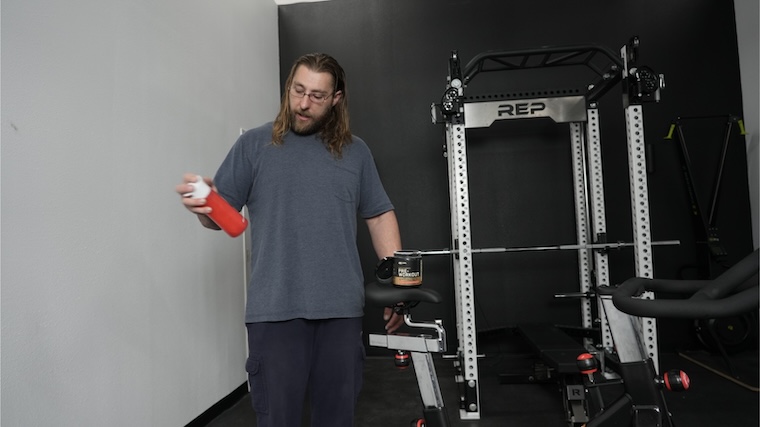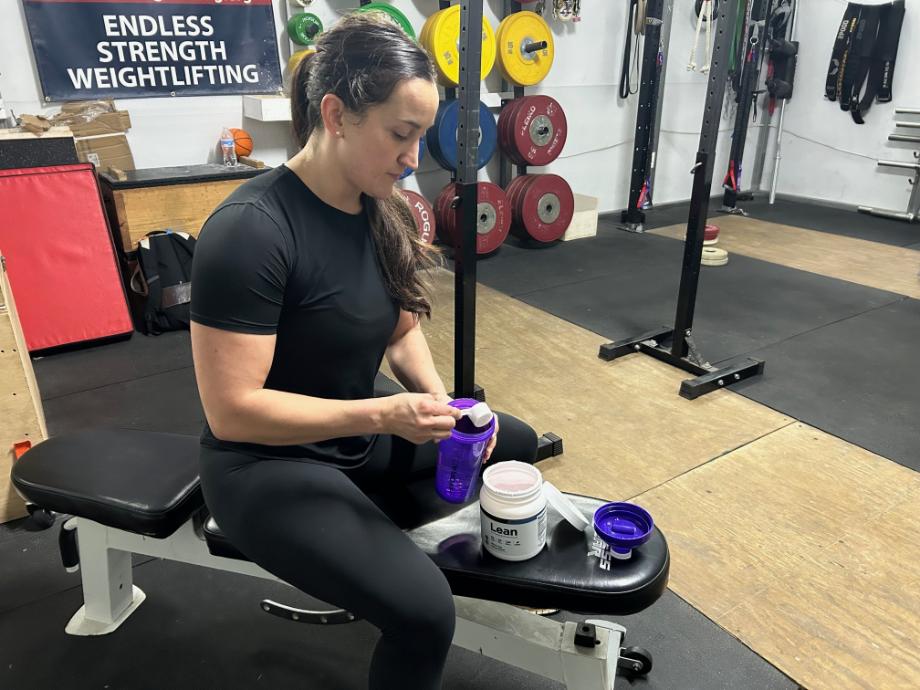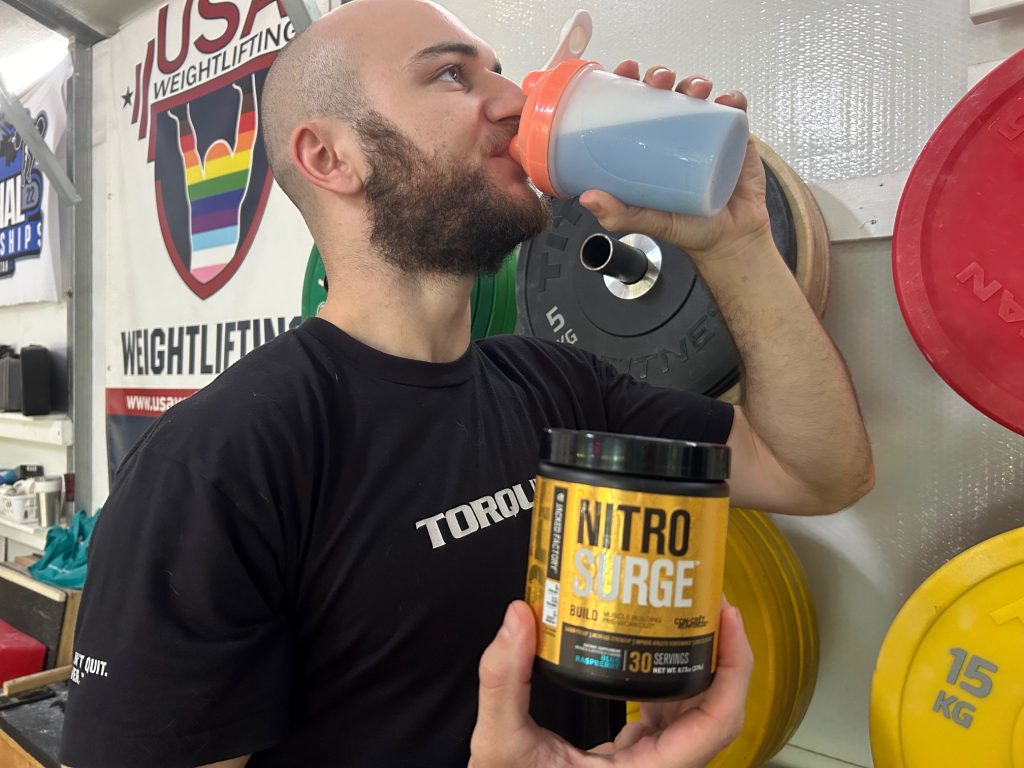According to your training schedule, today’s the day to get after it. You’ve been ramping up and progressively overloading just like your program says to. You want to go as hard as your regimen calls for, but your body — or your mind — just isn’t feeling it today.
Reaching for your pre-workout powder and tossing a scoop or two into your shaker bottle isn’t going to solve all your problems. But yes, it might help wake your body up and get your head in the game. The best pre-workout supplements are designed to focus your mind and your muscles so that you can perform your best in the gym. But when exactly are you supposed to take it? Here’s when to take pre-workout — and which factors should influence your decision.
Editor’s Note: The content on BarBend is meant to be informative in nature, but it should not be taken as medical advice. When starting a new training regimen and/or diet, it is always a good idea to consult a trusted medical professional. We are not a medical resource. The opinions and articles on this site are not intended for use as diagnosis, prevention, and/or treatment of health problems. They are not substitutes for consulting a qualified medical professional.
What Is Pre-Workout?
For the interested but uninitiated, pre-workout is a supplement — generally taken in the form of a powder mixed with water — taken before training to enhance performance in the gym.
Different brands of pre-workouts offer different ingredients. Some pre-mixed blends place a premium on increasing your focus during your training to help fuel that intensive mind-muscle connection many bodybuilders chase. Other pre-workouts will emphasize increasing your pump, or setting you up for increased recovery and muscle growth after your session.
The common denominator of pre-workouts tends to be their focus on increasing energy for your workout. So unless you’re opting for a caffeine-free version, you’re likely going to encounter a proverbial boatload of caffeine in a pre-workout.
Common Pre-Workout Ingredients
In a round-up of the top 100 commercial brands of pre-workouts, one study suggested that the most common ingredients in pre-workouts are as follows. (1) These ingredients include:
- Beta-alanine: This common pre-workout ingredient may be able to help you crank out a few extra reps by delaying muscle fatigue and lactic acid build-up. (2) You don’t need that much beta-alanine to reap the benefits. Taking between 1.6 and 5 grams in your pre-workout might boost your endurance in higher volume (8 to 15 rep) sets. (3)
- Caffeine: This stimulant adds an extra dose of focus and energy. It helps you feel awake by blocking the adenosine receptors that signal to your brain that you are tired. Research suggests that you only need 2 to 3 milligrams of caffeine per kilogram of body weight for an effective workout. (4) For the average person, this is 2 to 3 cups of coffee, so make sure you are accounting for all the caffeine you’re consuming if you’re also taking pre-workout. (5)
- Citrulline: Concerned about your power output and endurance? Citrulline might be able to help, as it can help improve circulation and blood flow — a must for exercising. Look for pre-workouts that have between 5 and 8 grams of citrulline for maximum effectiveness. (6)
- Creatine: Creatine may help boost muscle growth, strength, and recovery. It might also have a positive impact on mental focus and brain health. (7) For boosting strength or gaining muscle mass, opt for taking 3 to 5 grams per day. (7)(8)
If you’re aiming to keep sugar or artificial sweeteners out of your nutritional plan, be sure to check the ingredients label. While the active ingredients of pre-workouts might help get you pumped, you’ll want to make sure that what makes them taste good also meshes with your dietary plan.
Pre-workouts often come in pre-prepared blends — one scoop generally contains a multitude of ingredients. As a rule, it’s not advisable to take more than the recommended dose of any given supplement.
If you’re trying to stack different individual supplements together to mix your own pre-workout, here are some general numbers to keep in mind.
How To Take Pre-Workout
There are several safe ways to take pre-workout, and all of them involve mixing the supplement powder with at least the suggested amount of liquid. That’s how to properly take pre-workout — by mixing it into the amount of liquid suggested by the manufacturer. Some athletes might prefer that liquid to be water, while others may want to mask the taste in a pre-mixed blend or a shake.

But under pretty much no circumstances should lifters be dry-scooping pre-workout. The risks of dry scooping pre-workout are well-documented and include cardiac side effects, caffeine overdose, choking, and even death. (9)
Benefits of Pre-Workout
Lifters primarily use pre-workout to boost their energy levels energy and delay fatigue, but there are a handful of other reasons why someone would take pre-workout.
- Boost Energy and Delay Fatigue: Caffeine stimulates the central nervous system, which gives you more energy and helps you feel less tired. This bolt of energy can help you feel awake and motivated to power through your workout. (10)
- Enhanced Focus: The alertness that caffeine provides helps you feel more awake because it aids focus and alertness. Tyrosine is another ingredient in many pre-workouts that also contributes to cognitive function and concentration. (11) The extra focus can help you stay present during your workouts so you can get the most out of them.
- Improved Endurance: Citrulline and beta-alanine, other common ingredients in pre-workouts, may help give you more energy to help increase the time before your gas tank runs out. Lengthening the time before your rest periods can help you build more endurance. This also means potentially squeezing in more reps, which can lead to increased muscle growth. (2)(6)
- Improved Recovery: Creatine and BCAAs are often present in pre-workouts. These ingredients are key contributors to helping you recover faster and build muscle post-workout. (7)(12) This may also reduce muscle soreness after your workouts, which means you might not need as much time between workouts.
- Shorten Reaction Time: Because caffeine boosts cognitive function, it can help you react faster to stimuli. (10) This can be especially helpful with HIIT (high-intensity interval training) and power workouts where reacting quickly is necessary.
- Getting Your “Pump” On: Citrulline also helps with blood flow, which can help dilate blood vessels resulting in a filled-out “pumped” physique. (6) If you’re chasing that full, muscle look, check out our list of the best pump pre-workouts.
Side Effects of Pre-Workouts
Yes, pre-workouts’ main side effects are the fun ones — heightened focus, bigger muscle building potential, and more energy to crank out extra reps. But there are some other impacts to watch out for, too.

Increased Heart Rate
A moderate dose of caffeine will get your blood flowing and increase your heart rate in just the way you might be searching for. But high doses of 350 milligrams or over (which most of us hit after drinking one cup of morning coffee and one scoop of pre-workout) can cause a significant heart rate increase and potentially result in heart palpitations and an irregular heartbeat. (10) If you are sensitive to caffeine (or tend to drink a lot of coffee), this may be especially true for you and it’s best to consult with a healthcare professional before trying new supps, especially the strongest pre-workouts.
Insomnia or Interrupted Sleep Cycle
It takes about 1 to 9 hours for your body to metabolize caffeine. (13) Taking pre-workout up to 9 hours before going to sleep could prohibit you from sleeping soundly and through the entire night. The time it takes for caffeine to leave your body depends on the individual, so it’s important to listen to your body and pay attention to your own patterns.
Digestive Issues
If you’ve ever had to run to the bathroom after drinking your morning coffee, you know that caffeine isn’t always fun. This is because caffeine increases the rate at which food moves through the digestive tract. This accelerated gastric motility can result in diarrhea or loose stools, as the body has less time to absorb water from the food. (14)
Tingling Sensation
A side effect of pre-workouts that include beta-alanine is an itchy, tingly feeling. The feeling isn’t dangerous, and some users actually find this feeling enjoyable. (15) But if you’re not a fan of the tingles, you can check out our recs for best pre-workouts without beta-alanine.
What To Consider Before Buying Pre-Workout
So you’ve decided to take the plunge. Here’s what factors you should weigh before hitting that purchase button (or swiping your credit card, if you’re doing things the good old-fashioned way).
Quality Ingredients that Align with Your Goals
Finding a transparent supplement company that allows for third-party testing is the best way to know that you’re getting the best ingredients. Additionally, knowing your goals and the ingredients that will help you reach them is an essential part of selecting which pre-workout is right for you. The biggest ingredients to look for are caffeine (or not, if you’d rather go stimulant-free), beta-alanine, L-citrulline, and creatine.

There are also a lot of secondary ingredients you may seek out in a pre-workout depending on your goals. If you’re in search of the perfect pump, look for a pre-workout that also includes L-arginine; taurine and electrolytes can help with hydration, prevent cramping, and improve overall performance; and BCAAs and tyrosine are also included in some pre-workouts and may help with muscle soreness and aid recovery. (11)(12)
Theanine may smooth out the jittery feeling sometimes caused by caffeine and can help you feel relaxed. (4) If you’re looking for something without any artificial ingredients, you can try out a natural pre-workout. If your goal is to lose weight, you can try a pre-workout specifically designed for weight loss that may help boost your metabolism and help you burn more calories.
Stim vs. Non-Stim
There are many reasons why you may want to try a non-stim pre-workout. If you’re sensitive to caffeine or have heart issues, it may be important to consult with a healthcare professional before drinking a stimulant pre-workout. If you typically work out at night, you may also want to take a non-stim pre-workout. On average, a pre-workout contains 250 milligrams of caffeine, and having that much caffeine a couple hours before going to sleep may really affect your quality of sleep.

The FDA recommends consuming no more than 400 milligrams of caffeine a day and a cup of coffee has about 100 milligrams, so if you drink more than two cups of coffee, you may want to consider a non-stim pre-workout. (16)
Caffeine Dosage
Similar to deciding on a stim versus no stim pre-workout, it’s important to pick a pre-workout with the right amount of caffeine for you. Stim pre-workouts vary in caffeine dosage, so make sure you’re reading the label before trying, especially if you drink other caffeinated beverages throughout the day. Pre-workout can contain anywhere from 150 to 300 milligrams of caffeine.
One cup of coffee is around 100 milligrams of coffee (and that’s only if you’re drinking a measured-out 8-ounce cup — but even a small coffee at your local bodega is usually bigger than that. If you’re taking a 200-plus milligram pre-workout, ordering a small coffee on top of that already takes you over the recommended dosage of caffeine a day. It’s possible you could start to see severe negative side effects like heart palpitations, tremors, anxiety, headaches, dehydration, and diarrhea after consuming that much caffeine. (16)
[Related: Best Natural Pre-Workouts]
Cost per Serving
When you find a pre-workout that works for you, make sure you compare the cost per serving to determine if the pre-workout is worth it. It’s also important to consider if the ingredients are high quality and how many ingredients are included. This may seem like a small thing, but sometimes the price can seem reasonable while the serving size only lasts a handful of uses — making it a pretty big thing after all.
When Is the Best Time to Take Pre-Workout?
Here we are — the golden question. Exactly how long before your workout should you put that shaker bottle to good use? In terms of when pre-workout should be taken, the answer is at once simple and complicated.

The simple part is this: pre-workout supplements containing ingredients like caffeine, creatine, and amino acids seem to be most effective when taken about 30 minutes before an intense workout. (17)(18)
After some experimentation and learning about your body’s ways of processing different supplements, you might take your pre-workout a little earlier or later.
But it’s not always as simple as 30 minutes.
For example, the form of caffeine supplement you’re taking may make a difference in how quickly your pre-workout hits you. A caffeine capsule may take between 30 and 60 minutes to kick in. (19) If you can’t wait that long to get into the squat rack and under that barbell, you may feel the effects of caffeine gums or gels in as little as 10 minutes. (19)
How long pre-workout lasts depends on the one you take. Typically, you can feel effects between 30 to 60 minutes after taking it, but it’s possible you may feel the lasting effects between 4 to 6 hours. (13) Sometimes it could take even longer if your body is sensitive to caffeine.
Pre-Workout Timing in Context
Questions of when you should take pre-workout aren’t only about the hour or so leading up to your workout. It’s also about your supplement and nutritional habits in the days before your workout.

For example, if your favorite supps to take are the best pre-workouts with creatine, you might want to supplement with regular old creatine monohydrate on days you’re not taking pre-workout to keep a consistent amount in your system.
Similarly, repeatedly taking BCAAs (branched-chain amino acids) for three days before a workout may help fight off muscle soreness more than just taking supplements after your workout. (12)
In those kinds of circumstances, you’ll be thinking of pre-workout timing in a broader context than just chugging your shake on the drive to your gym. Instead, you’ll be thinking about the days leading up to your workout, as well.
Pre-Workout Timing, Explained
The ingredients in your pre-workout powder might be complicated, but your timing doesn’t have to be. The question of when to take pre-workout is settled around the number 30 (minutes, that is). Assuming you’re consuming a conventional pre-workout powder properly mixed with water, opt to take pre-workout around 30 minutes before your training session.
For some, that might mean taking it right before a long and luxurious warm-up routine. For others, it might mean sipping your pre-workout shake on the drive over to the gym. Whatever your routine, consider making your pre-workout a part of your training ritual. Consistency does tend to bring results, after all.
FAQs
Can you drink pre-workout while working out?
Drinking pre-workout during a workout isn’t always necessary. But if your training is particularly intense and extends beyond 90 minutes, you’ll likely want to refuel. (20) A simple electrolyte solution and glucose will do well, here. Toss some fruit snacks into your gym bag — those will often do the trick. But if you want to get a mid-workout boost from a pre-workout specifically, you could do that, too. If your pre-workout includes carbs, you might want to have some during an intense workout lasting longer than 60 minutes. (21) Just remember that its effects might extend after the end of your workout, which you may not want.
Can you take pre-workout at night?
If you’re an evening workout kind of person, there’s not necessarily any reason to avoid taking pre-workout. Nighttime gymgoers deserve gains, too. But side effects like insomnia aren’t uncommon with caffeine pre-workouts, especially if you’re generally a coffee drinker and getting close to nine milligrams of caffeine per kilogram of body weight. (22) To be on the safe side, you might want to err on the side of a non-stim version for your twilight gym sessions.
How does caffeine tolerance impact pre-workout?
Whether or not you’re a caffeine person may impact how often you should take pre-workout. Consider when you’re choosing your pre-workout that the minimum effective dosage for giving workouts a boost may be as low as 1.5 milligrams per kilogram of body weight. (19) Getting up to 9 milligrams of caffeine per kilogram of body weight may start impacting your sleep. (22) But as long as you’re staying within the tolerable limits for your body, it seems that having caffeine habitually won’t take away the effectiveness of caffeine in your pre-workout. (23)
References
- Jagim AR, Harty PS, Camic CL. Common Ingredient Profiles of Multi-Ingredient Pre-Workout Supplements. Nutrients. 2019 Jan 24;11(2):254.
- Maté-Muñoz JL, Lougedo JH, Garnacho-Castaño MV, Veiga-Herreros P, Lozano-Estevan MDC, García-Fernández P, de Jesús F, Guodemar-Pérez J, San Juan AF, Domínguez R. Effects of β-alanine supplementation during a 5-week strength training program: a randomized, controlled study. J Int Soc Sports Nutr. 2018 Apr 25;15:19.
- Hobson RM, Saunders B, Ball G, Harris RC, Sale C. Effects of β-alanine supplementation on exercise performance: a meta-analysis. Amino Acids. 2012 Jul;43(1):25-37.
- Smirmaul BP, de Moraes AC, Angius L, Marcora SM. Effects of caffeine on neuromuscular fatigue and performance during high-intensity cycling exercise in moderate hypoxia. Eur J Appl Physiol. 2017 Jan;117(1):27-38.
- Grgic J. Exploring the minimum ergogenic dose of caffeine on resistance exercise performance: A meta-analytic approach. Nutrition. 2022 May;97:111604.
- Suzuki T, Morita M, Kobayashi Y, Kamimura A. Oral L-citrulline supplementation enhances cycling time trial performance in healthy trained men: Double-blind randomized placebo-controlled 2-way crossover study. J Int Soc Sports Nutr. 2016 Feb 19;13:6.
- Kreider RB, Kalman DS, Antonio J, Ziegenfuss TN, Wildman R, Collins R, Candow DG, Kleiner SM, Almada AL, Lopez HL. International Society of Sports Nutrition position stand: safety and efficacy of creatine supplementation in exercise, sport, and medicine. J Int Soc Sports Nutr. 2017 Jun 13;14:18.
- Antonio J, Candow DG, Forbes SC, Gualano B, Jagim AR, Kreider RB, Rawson ES, Smith-Ryan AE, VanDusseldorp TA, Willoughby DS, Ziegenfuss TN. Common questions and misconceptions about creatine supplementation: what does the scientific evidence really show? J Int Soc Sports Nutr. 2021 Feb 8;18(1):13.
- Allison Lin, Nelson Chow, Mary O’Connor, Setu Mehta, Reta Behnam, Duy Pham, Claudia Hatef, Hannah E. Rosenthal, Ruth Milanaik; Dry Scooping and Other Dangerous Pre-workout Consumption Methods: A Quantitative Analysis. Pediatrics February 2022; 149 (1 Meeting Abstracts February 2022): 204.
- Guest, N. S., VanDusseldorp, T. A., Nelson, M. T., Grgic, J., Schoenfeld, B. J., Jenkins, N. D. M., Arent, S. M., Antonio, J., Stout, J. R., Trexler, E. T., Smith-Ryan, A. E., Goldstein, E. R., Kalman, D. S., & Campbell, B. I. (2021). International society of sports nutrition position stand: caffeine and exercise performance. Journal of the International Society of Sports Nutrition, 18(1), 1.
- Campbell, B., Wilborn, C., La Bounty, P., Taylor, L., Nelson, M. T., Greenwood, M., Ziegenfuss, T. N., Lopez, H. L., Hoffman, J. R., Stout, J. R., Schmitz, S., Collins, R., Kalman, D. S., Antonio, J., & Kreider, R. B. (2013). International Society of Sports Nutrition position stand: energy drinks. Journal of the International Society of Sports Nutrition, 10(1), 1.
- Ra SG, Miyazaki T, Kojima R, Komine S, Ishikura K, Kawanaka K, Honda A, Matsuzaki Y, Ohmori H. Effect of BCAA supplement timing on exercise-induced muscle soreness and damage: a pilot placebo-controlled double-blind study. J Sports Med Phys Fitness. 2018 Nov;58(11):1582-1591.
- Institute of Medicine (US) Committee on Military Nutrition Research. Caffeine for the Sustainment of Mental Task Performance: Formulations for Military Operations. Washington (DC): National Academies Press (US); 2001. 2, Pharmacology of Caffeine.
- Nehlig A. (2022). Effects of Coffee on the Gastro-Intestinal Tract: A Narrative Review and Literature Update. Nutrients, 14(2), 399.
- Liu, Q., Sikand, P., Ma, C., Tang, Z., Han, L., Li, Z., Sun, S., LaMotte, R. H., & Dong, X. (2012). Mechanisms of itch evoked by β-alanine. The Journal of neuroscience : the official journal of the Society for Neuroscience, 32(42), 14532–14537.
- Office of the Commissioner. “Spilling the Beans: How Much Caffeine Is Too Much?” U.S. Food and Drug Administration, FDA, 7 Sept. 2023.
- Smith AE, Fukuda DH, Kendall KL, Stout JR. The effects of a pre-workout supplement containing caffeine, creatine, and amino acids during three weeks of high-intensity exercise on aerobic and anaerobic performance. J Int Soc Sports Nutr. 2010 Feb 15;7:10.
- Cabre HE, Gordon AN, Patterson ND, Smith-Ryan AE. Evaluation of pre-workout and recovery formulations on body composition and performance after a 6-week high-intensity training program. Front Nutr. 2022 Nov 2;9:1016310.
- Grgic J. Effects of Caffeine on Resistance Exercise: A Review of Recent Research. Sports Med. 2021 Nov;51(11):2281-2298.
- Maughan RJ, Noakes TD. Fluid replacement and exercise stress. A brief review of studies on fluid replacement and some guidelines for the athlete. Sports Med. 1991 Jul;12(1):16-31.
- Naderi A, de Oliveira EP, Ziegenfuss TN, Willems MT. Timing, Optimal Dose and Intake Duration of Dietary Supplements with Evidence-Based Use in Sports Nutrition. J Exerc Nutrition Biochem. 2016 Dec 31;20(4):1-12.
- Grgic J, Mikulic P, Schoenfeld BJ, Bishop DJ, Pedisic Z. The Influence of Caffeine Supplementation on Resistance Exercise: A Review. Sports Med. 2019 Jan;49(1):17-30.
- Grgic J, Mikulic P. Acute effects of caffeine supplementation on resistance exercise, jumping, and Wingate performance: no influence of habitual caffeine intake. Eur J Sport Sci. 2021 Aug;21(8):1165-1175.